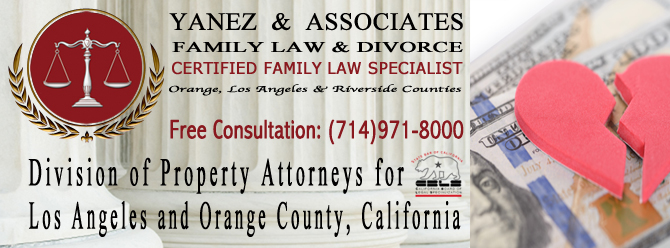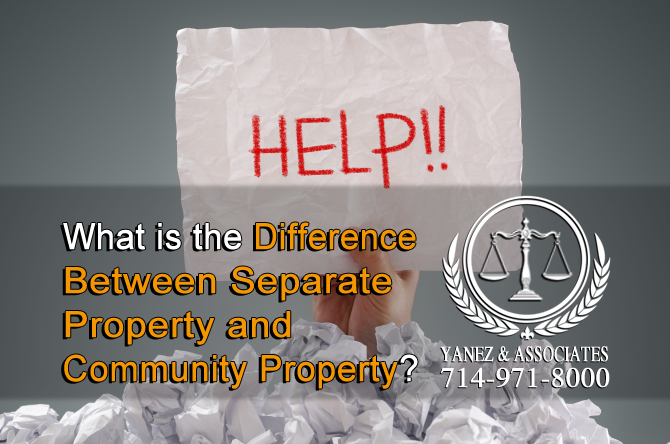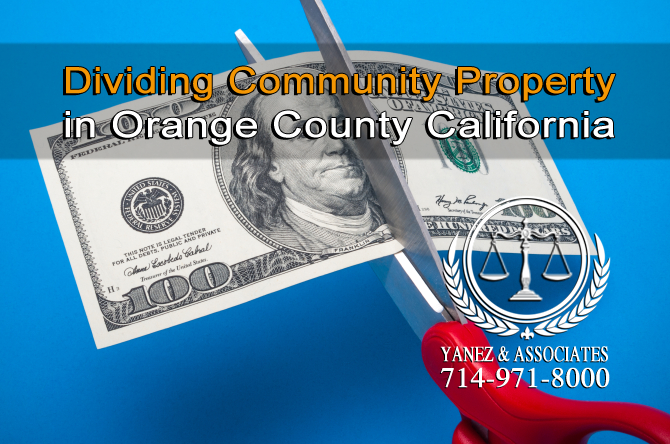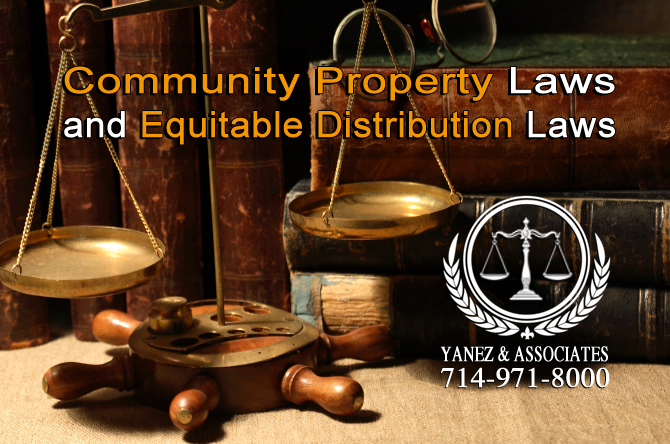I need help Dividing Property in an OC California Divorce
Dividing Property in an OC California Divorce or Separation: When a couple obtains a divorce or a legal separation in California, all debts and property that they have acquired during their marriage needs to be divided between them. The process of dividing property and debt during a divorce or legal separation in California is governed by community property laws.
Community property laws require that all property and debt be categorized as either separate property or debt, or community property or debt. Once categorized, the community property will be divided between the two parties.
So, what is considered to be property in California?
Before dividing property and debts between the parties, the law determines what, exactly, needs to be divided.
Property, under California law, is anything that the couple owns that can be sold or bought, or anything that has value. This includes physical property like a house, vehicle, furniture, clothing, or a coffee maker, and any assets that may have value now or in the future, like bank accounts, pension plans, life insurance, businesses, patents, stocks, etc.
Both parties must account for all property and debts, and report them to the other party in a form called a Declaration of Disclosure during divorce proceedings in California before the process of property division can begin.
Several issues can arise during the steps of this process. It is always best to consult a lawyer for assistance - especially during the process of categorizing property as either separate or community.
What is the Difference Between Separate Property and Community Property
The first part of the property division process is categorizing all property and debt as either community property or separate property. The State of California provides some guidelines for this process.
Separate Property
Separate property, in the simplest terms, is anything that either party earned, owned or owed before the date of the marriage, or before the registration of the domestic partnership, as well as anything that was acquired or earned, including debts and property, after the date the couple separated.
Separate property also includes gifts and inheritances given to one party during the marriage or registered domestic partnership, and anything purchased with the proceeds of the sale of any gift, inheritance, or other separate property.
Because separate property belongs to only one spouse or partner, it does not face division during the property division portion of a divorce or legal separation in California.
Sometimes, it may be difficult to distinguish separate property, especially if the couple has been together for a long time. The trick is to look at the source of the money that was used to purchase the property.
Community Property
Community property, on the other hand, includes things that either party earned, newly owned, or newly owed between the date that the marriage began or the domestic partnership was registered, and the date that the couple separated. Exceptions include gifts and inheritances to one party during that time period, and anything purchased with a gift or inheritance.
Community property also includes any earnings of either party during the marriage or registered domestic partnership, and anything that was purchased with those earnings. Like with separate property, looking at the source of the money that was used to purchase an item can help determine whether it is community property or not.
Credit card debt and other loans that were acquired during the marriage or registered domestic partnership are also considered community property, even if it was only one party that acquired the debt.
Additional Complications in Categorizing Property
However, the process of separating property and debts into these two categories is not as simple as it may seem. Quasi-community property and the commingling of community property and separate property can complicate the process considerably.
Quasi Community Property
Sometimes, during a marriage, a couple may move from one state to another, or to a third state, or back to the first state, etc. When this happens, property that is purchased in one state and then brought to another can complicate things during a divorce.
Quasi community property is any kind of property that the couple obtained during their marriage or registered domestic partnership in another state, that, had it been obtained in California, would have been considered community property.
So, anything that either party earned from a job while living outside of California, or any property that was purchased out of state, for example, is considered quasi-community property.
In a California divorce, quasi-community property is treated as if it were community property.
Commingling
When couples mix their finances, or when community property and separate property are mixed together, determining what is community property and what is separate property based solely on where the money originated can get complicated.
What if one party had purchased a home prior to the start of the marriage, but continues paying for it with earnings received after the date of the marriage? Those earnings are community property. What if both parties contribute to payments once they are married or have registered a domestic partnership? The equity in the home is now both community property and separate property.
Working with attorneys and finance professionals can help sort out who owns what and whether certain things are considered community or separate.
Dividing Community Property in Orange County California
Once property and debts have been categorized as either separate or community, the community property needs to be divided between the two parties. There are several ways to do this, and couples can even choose to do it on their own. However, until a judge signs off on it and issues a property division order, there is no legally binding order that can be enforced by the court.
In California, all community property should be divided equally between the spouses. This can be difficult when it comes to valuing certain things, like retirement accounts and businesses, but financial experts and lawyers can help. If you work with a good attorney who has experience with California’s property division laws, he or she may already have connections with other professionals who can help you value and divide your property equally.
Dividing property equally does not mean that everything is cut in half - when it comes to things like cars and homes, dividing the property itself is not possible. Even owning more than one car or home and giving one to each party might not be equal if one home or car is worth more than the other.
Giving everything a dollar value and then dividing the dollar amounts equally can be a great way to do it. One party might buy the other one out of a business or a home, or one party might take on certain debts in order to even out the division.
Community Property Laws and Equitable Distribution Laws
California is a community property state, but not every state is. Equitable distribution is another way to divide property in a divorce or legal separation, and most states use equitable distribution laws instead of community property laws.
The main difference is that while with community property all shared property is divided evenly; equitable distribution depends on what each party put into the marriage. Property is still divided into either community property or separate property. Community property, under equitable distribution laws, belongs to whichever spouse or partner earned it during the marriage, rather than belonging to both spouses equally.
The purpose of equitable division laws is to divide property fairly rather than equally. Depending on the state, equitable distribution will factor in other aspects of the divorce, like what one spouse gave up for the other to earn a degree or to receive other training for work, or to raise children.
Division of Property Attorneys for Los Angeles and Orange County, California

Looking for exceptional Division of Property Attorneys for Los Angeles and Orange County, California?
If you have questions about how property is divided in a California divorce or legal separation, you should contact an attorney as soon as possible. Dividing property and debts in a divorce can affect your financial and personal life following your divorce or legal separation, and is not something to take likely. The longer your marriage lasted, the more complex your property division is likely to be.
Contact the lawyers at Yanez & Associates today to schedule your free initial consultation with a California property division lawyer.















